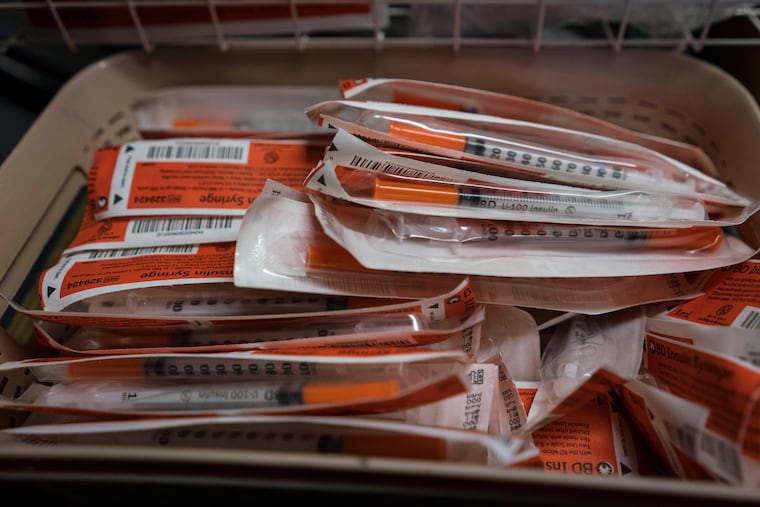I was a federal judge, and I support Safehouse. Here’s why. | Opinion
As a recovering drug user, I know that needle exchanges saved my life. Safehouse would do the same for drug users in Philadelphia.

When I graduated from my South Jersey high school in 1979, I was an honor student and a junkie. I shot methamphetamine daily. On commencement day, track marks and bruises covered my arms. I managed to graduate from the University of California, Berkeley. But during the next 10 years, I worked my way down the corporate ladder, destroyed relationships, deteriorated physically, and succumbed to depression and hopelessness.
Drug use is a choice, but dependence is not. Addiction is insidious because it’s difficult for a drug-addled mind to decide to clean up, much less follow through. Childhood traumas motivated me to seek relief, then speed rewired my brain, so I kept consuming that poison despite the many negative consequences. I felt like I could not stop, any more than I could jump to the moon. I believed my deep agony would kill me, probably through suicide, if I gave up drugs.
» READ MORE: Federal appeals judges hear arguments in government bid to block supervised injection site
Still, my survival instinct was strong enough to push me to pursue the rumors about a needle exchange, illegal but tolerated, in nearby San Francisco. Access to clean syringes allowed me to avoid diseases such as HIV and hepatitis. And to stay alive long enough to find recovery.
The needle exchange also provided a human connection. I was treated with respect and concern, encouraged rather than judged. The volunteers congratulated me for taking care of my health by showing up every week and softly initiated discussions about rehab. I began to absorb the idea that my addiction did not have to be a life sentence leading to my early death.
Supervised injection sites (SIS) like the one Safehouse seeks to establish in Philadelphia serve the same goal, with the additional benefit of preventing overdose deaths. The purpose is to carry out legitimate medical and public health initiatives that offer scientifically proven interventions effective for encouraging treatment and rehabilitation of individuals addicted to opioids. The Safehouse approach would save lives, avoid painful losses for addicts’ friends and family, and improve the community.
Harm reduction has a long history, with the designated driver campaign perhaps the most well-known. Another familiar plan involved pushing cigarette smokers out of public spaces to minimize second-hand smoke exposure and the resulting diseases.
» READ MORE: What to expect when your city is expecting a safe injection site | Opinion
Harm reduction values life and compassion and recognizes that, even if not ready to stop, drug users can make positive decisions. Needle exchanges arose because the threat of HIV was deemed a greater danger than drug misuse. The same rationale applies today as to drug overdoses and an SIS. Safehouse offers a practical approach that reduces risk, minimizes damage, and encourages those with substance use disorder to enter treatment.
Philadelphia is in the midst of an overdose crisis, with three people dying every day. Per the American Medical Association, studies have shown that SIS reduce overdose deaths and infectious disease transmission, with no increase in crime. In addition, more individuals with substance use disorder admit themselves into rehab.
Safehouse offers all these benefits by incorporating overdose prevention services, recovery counseling, referrals to support services, and guidance on initiating medically assisted treatment. The evidence from other countries shows that Safehouse also can increase the quality of life for the community by reducing public drug use and streets littered with discarded paraphernalia. Taxpayers will benefit from approximately $2 million per year savings in health-care and overdose response costs due to reducing ambulance rides, emergency room trips, and hospital visits.
» READ MORE: Facing pandemic and protests, Philly too ‘frayed’ for a supervised injection site right now, judge rules
As Thomas Farley, Philadelphia health commissioner, has said, “We cannot just watch as our children, our parents, our brothers, and our sisters die of drug overdose ... We have to use every proven tool we can to save their lives until they recover from the grip of addiction.”
I can attest to the value of such interventions. I have 26 years clean and sober. I am active in the recovery community. I am happily married. I went to law school and am a retired federal judge. And I am forever grateful for the needle exchange.
Mary Beth O’Connor, a retired federal judge, is a board member of LifeRing Secular Recovery and the She Recovers Foundation.